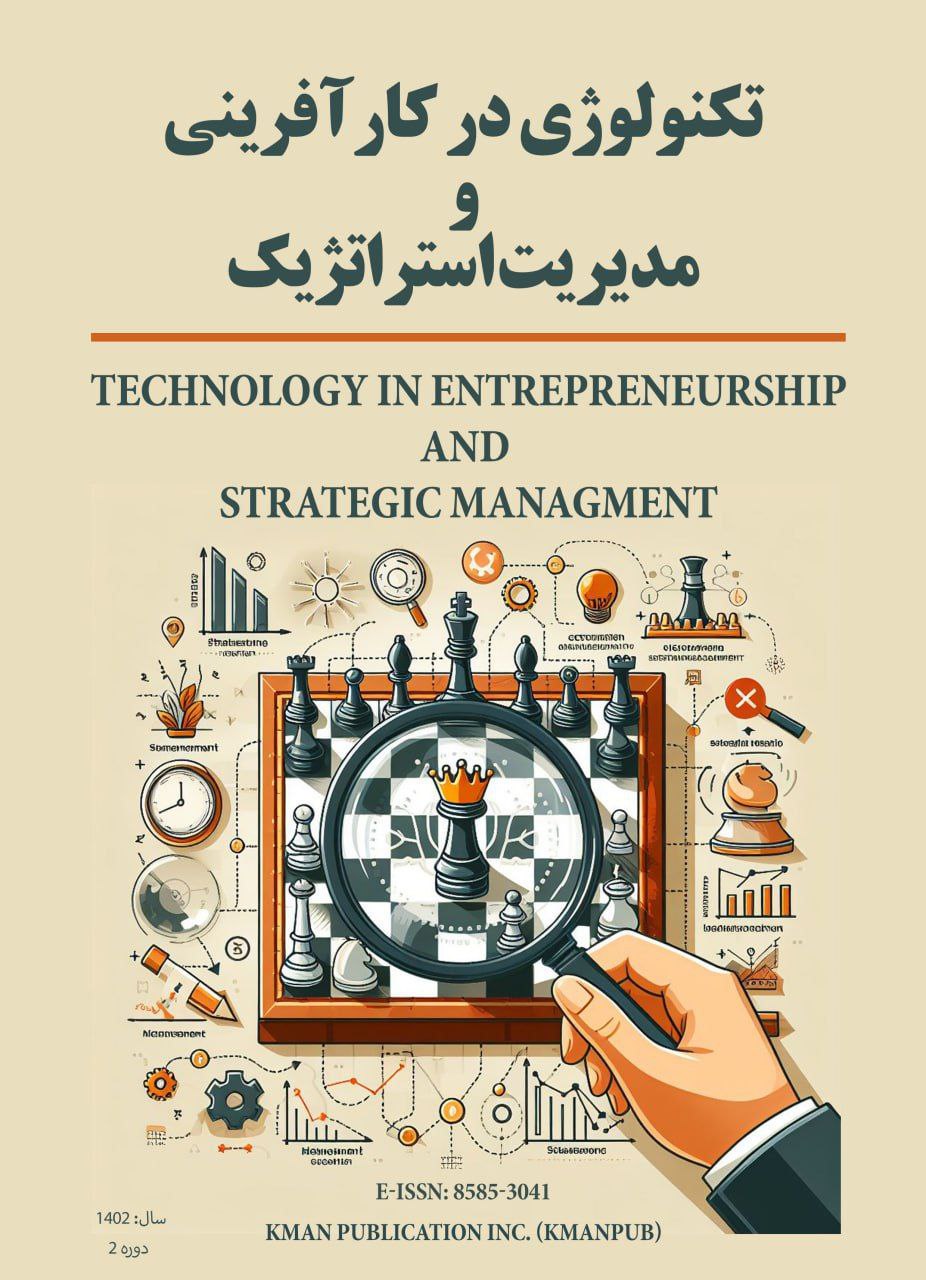مدل پارادایمی زنجیره تامین لجستیک معکوس جهت مدیریت پسماندهای صنعتی؛پژوهشی کیفی مبتنی بر رویکرد نظریه داده بنیاد
کلمات کلیدی:
زنجیره تامین لجستیک معکوس, پسماندهای فاضلاب صنعتی, صنعت پالایش گاز کشور, نظریه داده بنیادچکیده
رشد سریع فناوری دستیابی به فرایندهای جدید تولید،جایگزینی مواد مصنوعی و ترکیبات شیمیایی باعث افزایش حجم پسماندهای صنعتی و در برخی موارد باعث تولید پسماندهای خطرناک شده است.جابجایی انتقال و دفع نامناسب پسماندهای صنعتی که بخشی از آن نیز مواد خطرناک است،مشکلات زیادی را برای انسان و محیط زیست ایجاد مینماید.در چنین شرایطی وجود یک شبکه لجستیک معکوس ضروری میباشد.از طرفی امروزه، عمدتاً به دلیل افزایش نگرانیهای اجتماعی پیرامون محیطزیست، عبارت لجستیک معکوس ارتباط زیادی با مدیریت پسماند پیداکرده است. درواقع، مدیریت پسماندهای صنعتی میتواند بهعنوان یکی از مسائل لجستیک معکوس در مدیریت زنجیره تأمین در نظر گرفته شود. در پژوهش حاضر یک مطالعه کیفی به منظور ارائه مدل زنجیره تأمین معکوس برای مدیریت پسماندهای صنعت پالایش گاز کشور صورت گرفته است. در این پژوهش از روش داده بنیاد مدل اشتراوس و کوربین (۱۹۹۸)، استفاده شده و تا اشباع نظری مصاحبه شوندگان پیش رفته است. جامعه آماری به صورت هدفمند از خبرگان دانشگاهی و صاحب نظران صنعت پالایش گاز کشور انتخاب شده اند. نظرات 17 نفر از خبرگان و صاحبنظران حوزه تحقیق در قالب مصاحبه عمقی نیمه ساختتار یافته گردآوری و با بهره گیری از روش کیفی نظریه داده بنیاد مورد تجزیه و تحلیل قرار گرفت.در پایان از متن مصاحبهها 45 مولفه در قالب 6 مقوله انتخاب شدند و در قالب یک مدل پارادایمی اراپه گردید.
دانلودها
مراجع
Abdissa, G., Ayalew, A., Dunay, A., & Illés, C. B. (2022). Role of Reverse Logistics Activities in the Recycling of Used Plastic
Bottled Water Waste Management. Sustainability, 14(7650). https://doi.org/10.3390/su14137650
Gao, J., Xiao, Z., & Wei, H. (2021). Competition and coordination in a dual-channel green supply chain with an eco-label
policy. Computers & Industrial Engineering, 153. https://doi.org/10.1016/j.cie.2020.107057
Islam Panah, A., Jafar Nejad Chogoshi, A., Heydari Dehui, J., & Taghi Zadeh Yazdi, M. (2023). Designing a reverse supply
chain network for industrial waste using intelligent vehicular ad hoc networks (VANET): A case study of the automotive
industry in Iran. Civilica, https://civilica.com/doc/1871347
Jafari, P., Fahimi Nejad, A., Morsal, B., & Tayebi Sani, S. M. (2020). Study of barriers affecting the formation of reverse
logistics in sports events. Journal of Physical Education and Sport Sciences, 1-15. https://civilica.com/doc/1211523/
Khosravi, M. R., Homayi, R., & Hoorali, M. (2019). Designing a conceptual model for reverse logistics network management
with a focus on supply chain innovation. Innovation and Value Creation, 8(16), 1-15.
https://www.sid.ir/fa/journal/ViewPaper.aspx?id=558355
Mir Aghai, S. S. (2020). The impact of integrated reverse logistics on green supply chains with an emphasis on environmental
factors. First Conference on Industrial Engineering, Economics, and Management, https://civilica.com/doc/1025881/
Mugoni, E., Nyagadza, B., & Hove, P. K. (2023). Green reverse logistics technology impact on agricultural entrepreneurial
marketing firms' operational efficiency and sustainable competitive advantage. Sustainable Technology and
Entrepreneurship, 2(2). https://doi.org/10.1016/j.stae.2022.100034
Najm, H., & Asadi Gangaraj, E. (2021). Design of a reverse logistics network for electronic and electrical waste: A case study
of Mazandaran Province. Fourteenth International Conference of the Iranian Operations Research Association, Mashhad.
https://en.civilica.com/doc/1365967/
Qazi Far, A. K., & Rasouli, K. (2021). Study of influential variables on reverse logistics and closed-loop supply chain in the
oil and gas industry of Gachsaran using hierarchical methods. Seventh International Conference on Management and
Accounting Sciences, Tehran. https://civilica.com/doc/1257747/
Rau, H., Budiman, S. D., & Monteiro, C. N. (2020). Improving the sustainability of a reverse supply chain system under demand
uncertainty by using postponement strategies. Waste, https://pubmed.ncbi.nlm.nih.gov/34126468/
Saxena, N., Sarkar, B., Wee, H. M., Reong, S., Singh, S. R., & Hsiao, Y. L. (2023). A reverse logistics model with eco-design
under the Stackelberg-Nash equilibrium and centralized framework. Journal of Cleaner Production, 387.
https://doi.org/10.1016/j.jclepro.2022.135789
Taheri, M. T., Maki Al Agha, M., & Samadiyar, H. (2022). Prioritizing and managing industrial waste in the ninth refinery of
South Pars Gas Complex. Environmental and Water Engineering, 8(4), 842-855.
https://www.jewe.ir/article_146971_c5df0e9b2abce6eb1af1e8d80c4a8780.pdf?lang=en
Tavakoli, N., Sharifi, M., Khani Ali, M., & Ghasemi Mobtaker, H. (2023). Evaluation and design of a forward-reverse supply
chain network for the Shiraz biogas power plant. Civilica, https://civilica.com/doc/1895755
Vaezi, N., & Shahbazi Chagni, Z. (2022). Network analysis of barriers to reverse logistics implementation in the paper
industries of Saveh County. First International Conference on Research in Accounting, Management, Economics, and
Humanities, https://civilica.com/doc/1533558/
Weraikat, D., Kazemi Zanjani, M., & Lehoux, N. (2016). Two-echelon pharmaceutical reverse supply chain coordination with
customers incentives. International Journal of Production Economics, 176, 41-52.
https://doi.org/10.1016/j.ijpe.2016.03.003
Yu, H., Sun, X., Solvang, W. D., & Zhao, X. (2020). Reverse Logistics Network Design for Effective Management of Medical
Waste in Epidemic Outbreaks: Insights from the Coronavirus Disease 2019 (COVID-19) Outbreak in Wuhan (China).
International Journal of Environmental Research and Public Health, 17(1770). https://doi.org/10.3390/ijerph17051770
Zarei, H., Omrani, Q., & Sabat Aghlidi, P. (2012). Formulating waste management strategies in oil and gas refineries (case
study: Shiraz Oil Refinery). Conference on Wastewater and Industrial Waste Management,
دانلود
چاپ شده
ارسال
بازنگری
پذیرش
شماره
نوع مقاله
مجوز
حق نشر -1 تکنولوژی در کارآفرینی و مدیریت استراتژیک

این پروژه تحت مجوز بین المللی Creative Commons Attribution-NonCommercial 4.0 می باشد.











